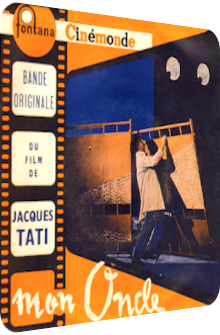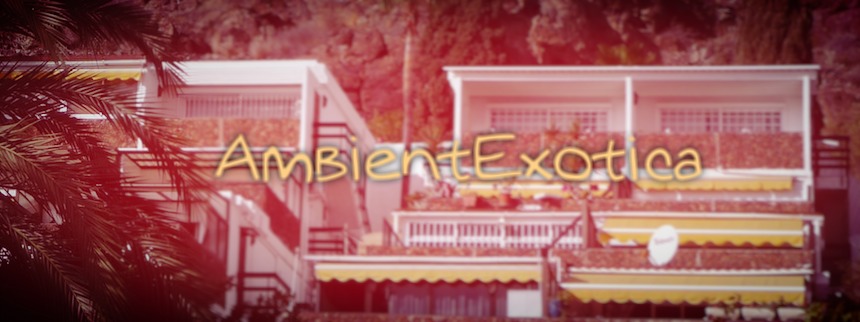
Franck Barcellini & Alain Romans
Mon Oncle
1958
It's time for another disclaimer: admittedly, the soundtrack to Jacques Tati's famous Academy Award-winning French comedy film Mon Oncle, released in 1958 to mixed reactions that turned into critical acclaim a few months later, doesn't really belong to the Exotica genre. But whatever, I argue that this is no problem, because in the end, both the film and the soundtrack by the various composers, among them the above messieurs Franck Barcellini and Alain Romans, present a mid-century modern setting that is vivacious, futuristic and très rétro, depending on whose side you're on in the movie and due to the primary reason you are watching this film.
Is it due to Oncle Hulot's – played by Jacques Tati himself – hazardous lack of skills about all technology-related things, the gorgeous architecture of his young nephew's heirloom, a celestial gadget-driven villa with water-spluttering stone seals, trimmed hedges and cutting-edge stoves, or the rural countryside as the important counterpart to the exclusive-elusive high tech world between which the movie oscillates incessantly? Whatever your raison may be, the quirky soundtrack fits right in and underlines Hulot's struggle in an efficiently exhilarative way.
One might put this little EP of four tracks – well, three tracks plus a medley of them – into the Exotica genre for the following reasons: firstly, it encapsulates a definite French feeling with a strong emphasis on accordions and tipsy piano keys in higher regions. And trips to Europe were quite exotic for the average U.S. American back then. Secondly, French motifs or the supposed clichés françaises are an established topos on many an Exotica release: John Scott Trotter's Escape To The Magic Mediterranean (1956), Norrie Paramor's Jet Flight (1959), Irv Cottler's Around The World In Percussion (1961) as well as quite a few compositions by the likes of Les Baxter and Andre Kostelanetz cater specifically to a yearning North American audience. And once the feeling of wanderlust is involved, the use of the term Exotica is close at hand. Now that we've settled this discourse (we have settled it, non?), let's see how the themes of this little EP copes when it is detached from the movie.
The EP starts with Franck Barcellini's iconic theme called Mon Oncle. The repetitive exuberant twelve-note motif on the piano is underlined by silkened flutes, Balearic guitar twangs and bonfire banjos. Once the castanet-accompanied accordion enters the scene, you'll literally find yourself in France. There's even the slightest glimpse of dreaminess perceptible as the vibrant sustain of a few mellifluous vibraphone backings appears. The theme's big strength is its intimacy and well-constructed reduction. This is neither an orchestral piece of pompousness nor a mocking aesthetic artifact of the French savoir vivre. It depicts the playfulness and the oxymoronic bustling idleness of a small hamlet, or more poignantly, the characteristic traits of Oncle Hulot.
The next theme by Barcellini, Le Vieux Quartier, puts an even greater focus on the dim-witted bon vivant. It is played when the viewer encounters a first glimpse on the house of Hulot – a strong countervailing scenario to the futuristic-materialistic palace of his relatives. This theme is particularly romantic and warm-hearted thanks to its festive accordion chords, gourd-like pizzicato performance on the banjo and rosé-esque piano notes. A short part of a streamlined clarinet is interwoven and rounded off with a barely noticeable scent of vibraphone droplets. Everything reminds of the kitschy countryside and a good humble life that can be lived in a satisfying way even without any technical gadgetry. The final unique composition was written by Alain Romans.
Adieu Mario is a jaunty eight-note theme on both the flute and the banjo, sharing the instrument-related setup with Barcellini's arrangements. Smooth double bass backings with traversing piano whirls, accordion notes and the almost unsuspected addition of vestigial trumpet curlicues meet in another jaunty song. However, the trumpet isn't used to emphasize the lovable stupidity of Hulot as one might expect, but is simply used for reasons of variety. The final Arrangement Sur Les 3 Thèmes Du Film is not much more but a presentation of all three themes grouped together in one track.
A big shout-out to my friend Amy Thyr aka Eme Tiki, designer and tikiphile, who introduced me to this great movie, and I've only got a chance to watch it very recently in French with French subtitles. I can say for sure that I was blown away by the beautiful colors, the camera angles, weird personae … and the soundtrack. While there are several other compositions scattered throughout the film and on various LP's, the above themes are the most well-known which are incidentally featured many times in several scenes. As I've stated before, the music of Mon Oncle doesn't mesh with the usual prospects one has about the genre.
There are no faux-Polynesian jungle drums, no ukuleles or exotic percussion. However, there's plenty of picturesque kitsch to be found in-between each theme, and I have to stress once more that the presumed European lifestyle itself has been considered exotic at times, as have the various romantic locations and rural landscapes of France. String-focused conductor Andre Kostelanetz, better known by Exotica fans for his albums Lure Of The Tropics (1954) and Lure Of Paradise (1959), has coined this yearning for Old Europe in another Lure album called Lure Of France (1957) which was maybe, probably, possibly a reaction to the rise of the French movie in the United States and all around the world. And so it happens to my mind and big heart that the soundtrack of Mon Oncle is closely tied to the Exotica genre. It's mid-century modern music, but since this perception is again closely affiliated with Exotica, I'll let it slip. If you feel the same way, you'll surely like the jocular mood of the three themes and their French flavor. You can also find these themes on various compilations of Jacques Tati's soundtracks, just search for them at your favorite digital music store.
Exotica Review 098: Various Artists – Mon Oncle (1958). Originally published on Jul. 28, 2012 at AmbientExotica.com.
